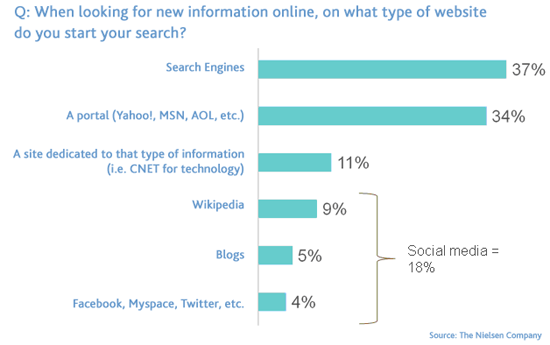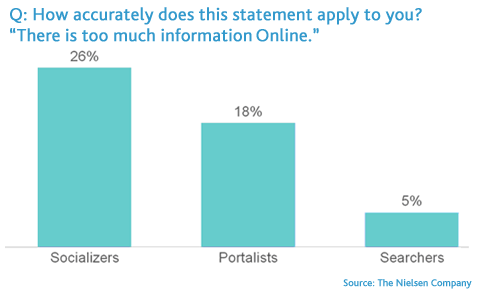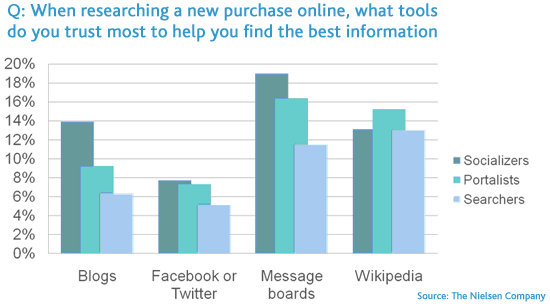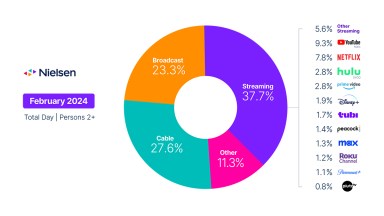Jon Gibs, VP Media Analytics
In the beginning there were ISPs, which then gave way to portals ? aggregators of content and links ? which then led to the rise of “search” as the dominant form of Internet navigation or, how we get to where we we’re going on the web. However, as with most forms of evolution, change is constant, and over the past two years search navigation has appeared to shift to social media.
We continue to see that social media has not only changed the way consumers communicate and gather on the Web, but also impacted content discovery and navigation in a big way. But how? Is social media taking the place of portals and search as the hub of online navigation?
These questions led to some in-depth research – including an online panel survey of 1,800 participants fielded in August 2009 – in which we looked at three main consumer segments using search (Searchers), portals (Portalists) or social media (Socializers) as their primary vehicle for content discovery.
What We Found
In a nutshell, there is a segment of the online population that uses social media as a core navigation and information discovery tool — roughly 18 percent of users see it as core to finding new information. While still a smaller percentage than those who use search engines or portals like Yahoo! or MSN, it is a significant figure. And as social media usage continues to increase (unique visitors to Twitter.com increased 959% YOY in August) I can only expect this figure to grow.

The appeal of Social Media
At the root of the changing nature of content discovery is the sheer amount of information that is available on the Web. If you want to learn more about the latest smartphone released into the market, your favorite search engine is sure to provide you with hundreds, if not thousands, of articles about the device. But with the increasing number of resources available, it’s difficult to know what you should believe or take at face value. Socializers – those who spend 10 percent or more of their online time on social media – feel this effect more than others do. When asked, 26 percent feel that there is too much information available on the Internet, compared to 18 percent of people who predominantly use portals and just 5 percent of people who primarily use search engines.

But why does too much information lead one to use social media as a navigation tool? The short answer: Socializers trust what their friends have to say and social media acts as an information filtration tool. This is key because Socializers gravitate towards and believe what is shared with friends and family. If your friend creates or links to the content, then you are more likely to believe it and like it. And this thought plays out in the data.
We saw the power of opinions posted online in our global study earlier this year about trust in advertising, and the point came up again in our recent findings. Social media is becoming a core product research channel. Almost 15 percent of Socializers most trusted information they found on blogs when researching new purchases online, while nearly 20 percent trusted most the information they found on message boards.

So are social networks replacing portals or search engines? Perhaps. Regardless, if we don’t understand and address people feeling increasingly alienated by the amount of information on the Internet, and the need for a human guide, yes, your favorite social network (or something like it) will become the next great content gateway.
For more, join me for our webinar The Evolution of Content Discovery on Tuesday, October 6 (2PM ET)



